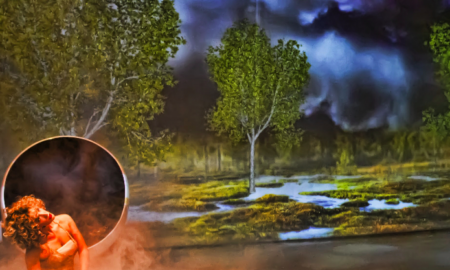Vallo Toomla’s debut feature “Pretenders” tells the story of Anna (Mirtel Pohla) and Juhan (Priit Võigemast), who go to the country house of their rich friends to vacation and mend their relationship. However, the situation is far from an intimate idyll and, as if this was not enough, they offer accommodation to a couple caught up in a storm, who think they are the owners of the house. Anna and Juhan go along with the game, but there is no doubt that settling into the role of the masters of the house is only a drop in the ocean of pretence.
Right in the beginning of the film we learn that Anna has just had an abortion and she reminds Juhan of it with cutting remarks throughout the film, so it becomes one of the central motifs of the difficulties in their relationship. When Juhan finds out that he is about to be made redundant and comments that “at least they have no loans or leases”, Anna adds casually “… or children” and leaves demonstratively. During a meal she quizzes their guests about whether they have children and declares then that she and Juhan cannot have children as Juhan is infertile. Anna’s constant wish to distance herself from her partner, humiliating him and even blurting out that she cannot be alone with him, alternating with Juhan’s utter astonishment and incomprehension of Anna’s behaviour, give an idea how traumatic giving up the child must have been for Anna and how alone she is with this trauma.
What really happens in “Pretenders” and whether it happens, can be interpreted in a number of ways. For example, one could weigh the option whether the other couple – Triin (Mari Abel) and Erik (Meelis Rämmeld) – only portrayed the confusion within Anna and Juhan. They functioned as a so-called materialised reflection, in which the realistic-negativistic self-perception (modest lifestyle, unemployment, simple way of life), mixes with dreams (potential to have children or a sincere wish to spend time as just a couple) as well as the darker side of personality (savage fits of rage, during which one is willing to kill the other). Instead of a complete reflection, however, they pointed to Anna and Juhan’s paranoias – fear of there being someone who knows what they are really like, where and how they live, and can perhaps do it all better than them.
Nevertheless, there is no reason to fear that the film is either too serious or too dark. The dialogues are mostly playful and witty and help to continuously develop the film despite the visual slowness, add new nuances and keep everything in motion. Unfortunately, there was no escaping some rather silly characters, whose only objective is to alleviate the general tension by some local jokes. In „Pretenders”, these characters are the neighbour and his boozing wife. They represent a sort of Estonian Thing in an otherwise nationality-neutral film. While a person with an alcohol problem mowing the lawn and riding a bike should probably create a spark of recognition and make the viewer grin, it actually seems a little tasteless and destructive of the overall atmosphere. Otherwise, “Pretenders” is a finely woven film with its minimalist architecture, beautiful nature and musical design, which leaves time for breathing.

